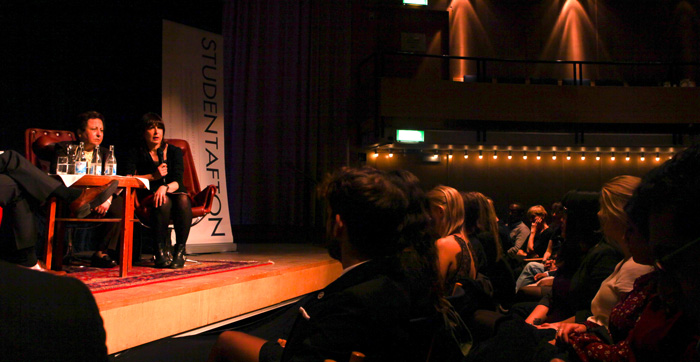The Nobel Laureate and judge Shirin Ebadi spoke about human rights, democracy and Islam during Thursday’s nights Studentafton.
The stage, resembling a cozy family room with big armchairs, a small coffee table, and fancy rug, created the feeling as though we, the audience, were waiting to chat with an old friend over a cup of coffee. However, instead of an old friend, a full house eagerly awaited the arrival of Nobel Laureate, human rights activist, author, lawyer, judge, and mother Shirin Ebadi to take the stage for a discussion about “Islam, Democracy, and Human Rights” at Lund’s Studentafton on September 30, 2015. Not an inch past five feet, this small woman has a tall list of accomplishments and packs a powerful punch in the fight for human rights in the Middle East.
When asked her feelings upon finding out she had been selected as the winner of the 2003 Nobel Peace Prize, Ebadi made the audience laugh by saying she, ”was very surprised because [she] didn’t even know that [she] was a candidate.” In the aftermath of the 1979 Revolution, according to Ebadi, the Iranian government became increasingly oppressive and patriarchal. Her monumental achievement was thus dismissed by the Iranian government, and this same government had previously stripped her of her position as a judge, to which she, “straight away thought [she was] not going to stop [her] efforts and [she was] going to make sure that [the government] regrets that decision.”
Ebadi warned of the dangers of a government that is not separate from religion, but rather uses religion to oppress the people. She faced opposition from the government for using sharia law as part of her justification for supporting a law that granted women the right to divorce. However, she did so because, “when an undemocratic country starts a fight with [her] using sharia law as a weapon, [she has] to fight back with sharia law.”
Furthermore, she stressed the importance of creating new laws that not only protect its citizens and promote order, but that also influence the progression of society away from, rather than towards, oppression. One of the problems of Iran, she mentions, is that, “the culture of the society is above the law…and as a result discriminatory laws are enforced which lead to that social tension.”
While she has faced many obstacles along her journey, such as exile from Iran, losing all possessions, and the government shutting down her NGO, she stressed the importance of perseverance in following one’s dreams. Throughout her entire discussion, the audience, both a mix of young students and older professionals, attentively listened to her stories and advice, perhaps the most important of which being that we, “have dreams, follow [our] dreams, and never be afraid of defeat.”






